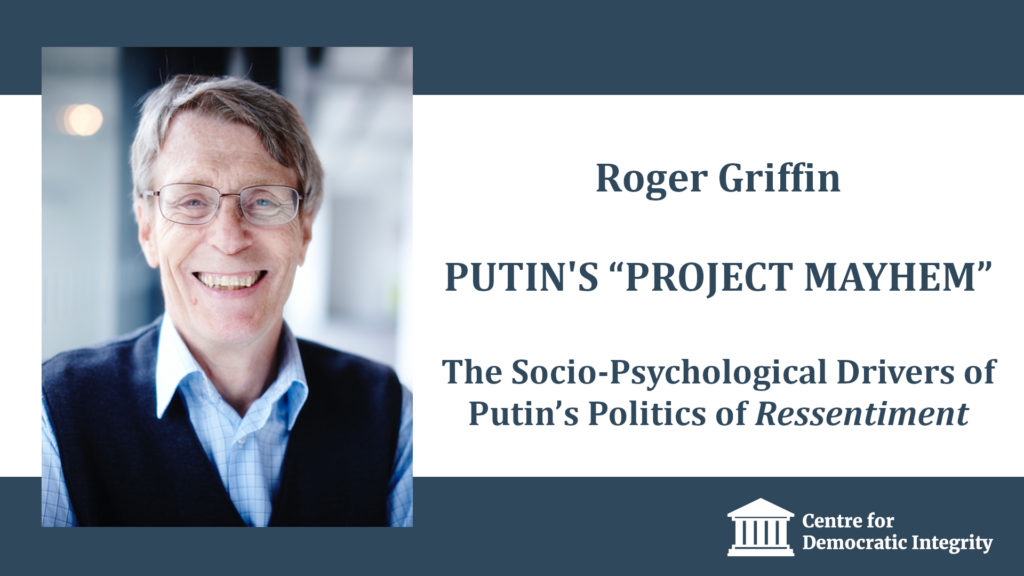Event: Putin’s “Project Mayhem”. The Socio-Psychological Drivers of Putin’s Politics of Ressentiment

The Centre for Democratic Integrity hosted an event featuring the leading expert on the socio-psychological dynamics of fascism and terrorism Professor Roger Griffin.
The event consisted of two parts:
Part 1 is a PowerPoint presentation of “Putin’s ‘Project Mayhem’. The Socio-Psychological Drivers of Russia’s Politics of Ressentiment“. The presentation was prepared by Roger Griffin and consists of the slides and Griffin’s commentary to the slides. However, Griffin suggests that, in addition to listening to his commentary, the slides should also be consumed without his narrative at their own pace (by turning it off in PowerPoint -> Slideshow > Uncheck the box marked “Play narrations”).
The PowerPoint presentation “Putin’s ‘Project Mayhem'” can be downloaded here. You can also watch a video based on the PowerPoint presentation:
Part 2 is a live discussion of the presentation featuring Roger Griffin himself and moderated by the director of the Centre for Democratic Integrity Dr. Anton Shekhovtsov. The discussion took place via Zoom on the 5th of May, 2021. Watch the online discussion here:
Description of the event:
Roger Griffin’s presentation seeks to complement the extensive literature analysing the domestic and foreign policy of Vladimir Putin and his widespread popularity within significant segments of the Russian population. It does so by examining through the lens of the Nietzschean concept of “ressentiment” what have been described as the “malign” tactics which he adopts and the “malicious” state actions which he sanctions against foreign states and national citizens he considers hostile to Russia.
Having reviewed different instances of devious and underhand anti-democratic politics engaged in by the Russian state under Putin, Griffin introduces Nietzsche’s distinction between on the one hand the overt displays of aggression and hatred towards “othered” enemies characteristic of “master morality”, and on the other the covert forms of veiled belligerence, political subversion and tactical mischief adopted by some states. These can be associated with what the philosopher terms “slave morality”, which in the political sphere results from experiences of national trauma and humiliation, combined with a concomitant inferiority complex and sense of vindictiveness. These negative affects, especially when combined with objective vulnerabilities or structural weaknesses, tend to cause a sense of wounded pride and open hostility to be replaced by resentment, simmering anger, and subterfuge directed to “getting even”, if necessary resorting to the “dirty tricks” typical of moral cowardice and dishonesty.
The subversive, clandestine syndrome, both psychological and militant, thus identified is illustrated by the link explicitly made in Palahniuk’s Fight Club between the generational loss of identity, hope, and purpose in the late 20th century US, and the nihilistic violence graphically described in “Project Mayhem” directed at the New York skyscrapers which symbolize an existentially vacuous consumerist society based on the credit card. The heuristic value of recognizing foreign policies based on a sustained sense of grudge or grievance as a genus of “resentment politics” is then briefly considered in the context of three further contemporary situations of asymmetrical threat. In all three cases ressentiment has led to aggressive tactics based on sustained deception and undercover projects designed to undermine the social cohesion, self-confidence and sense of invulnerability and superiority of the West: ii) North Korea; ii) groupuscular or lone agent terrorist attacks on civil society by communists and fascists; iii) the growth of militant and terrorist Islam.
About Roger Griffin: Emeritus Professor at Oxford Brookes University, best known for The Nature of Fascism (1991), Modernism and Fascism (2007); Terrorist’s Creed: Fanatical Violence and the Human Need for Meaning (2012); Fascism: An Introduction to Comparative Fascist Studies (2018), and for co-founding the journal Fascism and COMFAS, the Association for the Comparative Fascism Studies. He has also assembled several major anthologies of primary and secondary sources relating to fascism. His main research interests are fascism, populism, terrorism, and more generally the way modern society generates minority movements of extremism and fanaticism, a tendency accelerated by the growing power of social media and vulnerability to conspiracy theories and other forms of paranoid and Manichaean politics and social movement.
